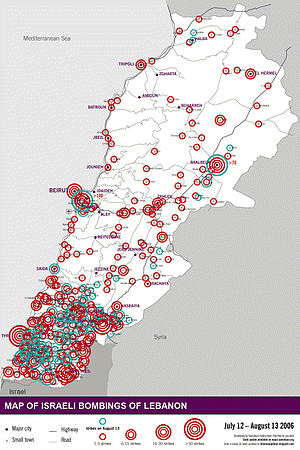Franklin Lamb
Oxford
This week's words from the Levant offer contending messages for Israel's and Hezbollah's friends and foe alike:
"We are naturally unhappy about the fact that Lebanon will be largely destroyed. Ask Iran why this may well happen? But be assured that it won't drag on for anything close to 34 days like last time. (July 2006). We urge all civilians to leave Hezbollah controlled neighbourhoods." 9/27/2017--- An aide to Foreign Affairs and Defense Committee chairman MK Avi Dichter who asked that his name not be made public.
"Netanyahu and his military leadership do not know where a war might lead them should they start it, and they do not have a real picture about what will await them in the next war. I call on non-Zionist Jews to leave occupied Palestine to the countries they came from so that they don't be the fuel of the next war, seeing as they might not have enough time to leave."--- Hezbollah's Hassan Nasrallah 10/1/2017 during his south Beirut speech commemorating the 10th day Ashoura
. The view of many analysts in the Israeli and American military leadership as well as among the Israeli lobby in the US Congress is that Israel must ensure that the next war is short. The shorter the better for many reasons. One being that Washington will not 'green light' a protracted war that kills large numbers of Lebanese civilians. Another one is that the Israeli public and politicians will not accept many Israeli military or civilian casualties.
[Diagram courtesy of Maher Allouch. 9/22/2017. This diagram shows Israeli bombsites across Lebanon in 2006. What will the next one look like?]
Hezbollah's forces have a history of disciplined and skilled high-risk fighting techniques despite paying a high "martyrs" price. They will likely do so again. And they are preparing expecting, preferring and intending to pursue a longer war: "The longer the better for many reasons".
One reason is that both sides are acutely aware that a drawn out war with Hezbollah saturating Israel with approximately 2000 missiles daily will cause nearly unimaginable damage to Israel's military bases, infrastructure, civilian neighborhoods and population. And unless there is a hastily arranged enforceable ceasefire the war will not end even when there is not a lot left of Hezbollah neighborhoods as occurred in 2006. Or of many of Israel's and Lebanon's--- unless mass public protests and demonstrations flood Israel's streets and swarm Parliament, because the UN Security Council will likely be paralyzed as unfortunately has become its recent fate.
For a few reasons Israel has not, and likely will not succeed in curtailing a large portion of Iran's arms shipments to Hezbollah which moves them from Syria to where they want to position or store them around Lebanon, or according to source in Daraa, South Syria near the Israeli controlled Golan Heights. A significant reason Israel cannot stop the shipments is the 200 miles Lebanon-Syria sieve-like border created and maintained by centuries of locals smuggling just about anything both ways from literally hundreds of tree covered and mountainous routes traversing the borders.
(Note: You can view every article as one long page if you sign up as an Advocate Member, or higher).






